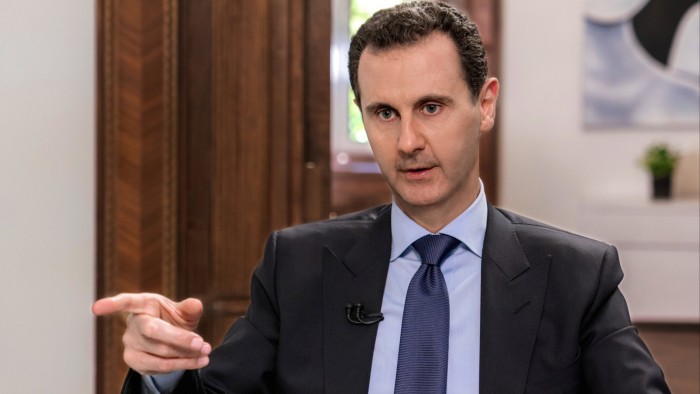Unlock the Editor’s Digest for free
Roula Khalaf, Editor of the FT, selects her favourite stories in this weekly newsletter.
Syria’s deposed president Bashar al-Assad has denied that his exit from the country was pre-arranged, saying that he stayed until he was trapped on a military base that was under attack.
In his first statement since a rebel offensive began taking territory almost three weeks ago, Assad said he stayed in Damascus until the early hours of Sunday December 8, when he moved to the Russian base at Hmeimim on the Mediterranean coast.
The former leader said that as drone attacks were launched against the base and as leaving by land became impossible, Moscow put in a request to the base’s command for an immediate evacuation to Russia.
“My departure was neither planned nor did it occur during the final hours of the battle,” he said. “At no point during these events did I consider stepping down or seeking refuge, nor was such a proposal made by any individual or party.”
The statement was published by the former Syrian presidency’s official Telegram channel and Facebook page, which it said was the “only viable option” after attempts to publish through Arab and international media outlets were unsuccessful. It was also carried by the Russian state newswire Tass.
Assad was overthrown on December 8 by rebel forces led by Hayat Tahrir al-Sham, an offshoot of a former al-Qaeda affiliate that swept through Syria in a lightning offensive to end the Assad family’s half-century of rule, which was characterised by brutal repression and corruption.
As the rebels advanced towards the capital on December 7, Syrians around the world tuned in to state television after widespread rumours that Assad would make a speech.
Instead an army commander gave a short statement, warning Syrians not to believe what he claimed was a media campaign to sow strife.
After Assad failed to appear that night, thousands of his supporters left Damascus, believing their leader had abandoned them, according to people who left and footage shared on social media.
Assad said that when he arrived at the base the following day, “it became clear that our forces had completely withdrawn from all battle lines and that the last army positions had fallen”.
Loyalist anger with Assad has only mounted since, in the absence of any public statement. Assad’s resignation and departure to Russia were announced by Moscow’s foreign ministry on Sunday. It said Russia was “not a party in those negotiations”.
Assad said the delay in the release of his statement was due to “prevailing circumstances at the time, including a total communication blackout for security reasons”. He promised a more detailed account of the events “when the opportunity allows”.
“I have never sought positions for personal gain but have always considered myself as a custodian of a national project,” he said, adding that his departure “does not, in any way, diminish my profound sense of belonging to Syria and her people”.








